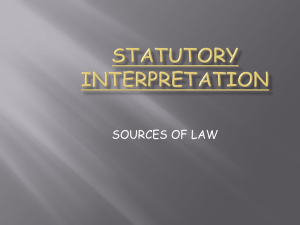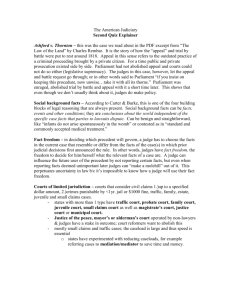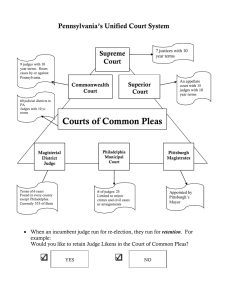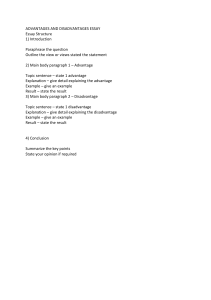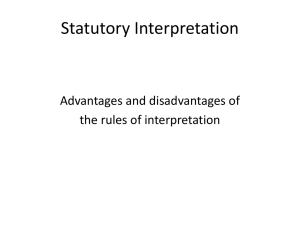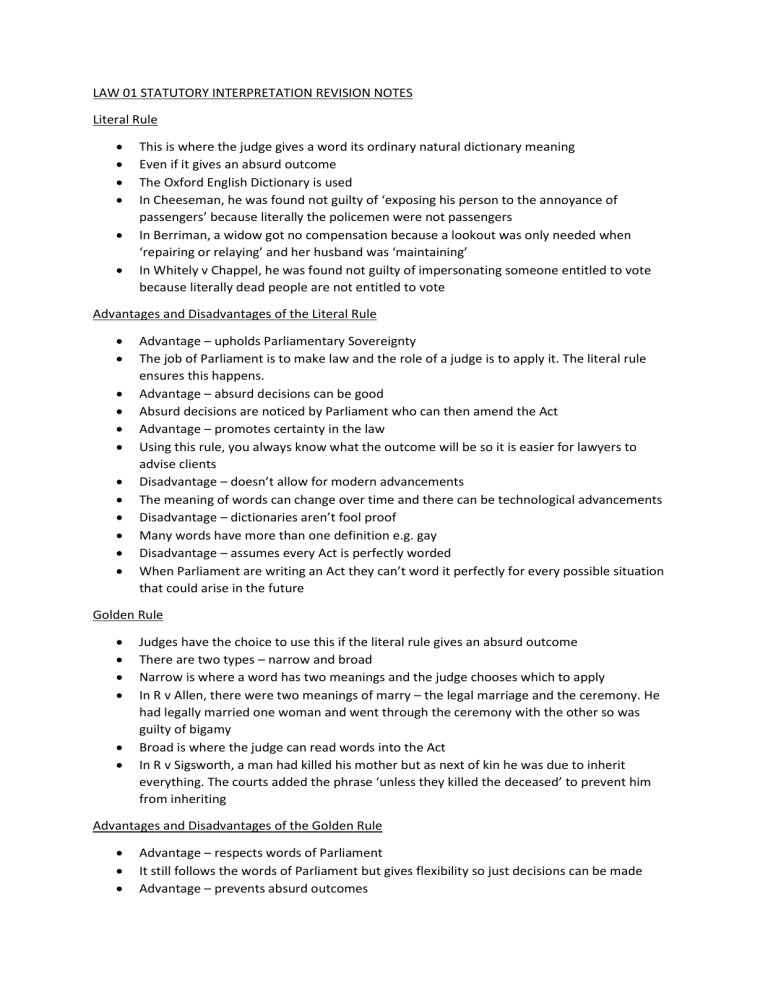
LAW 01 STATUTORY INTERPRETATION REVISION NOTES Literal Rule This is where the judge gives a word its ordinary natural dictionary meaning Even if it gives an absurd outcome The Oxford English Dictionary is used In Cheeseman, he was found not guilty of ‘exposing his person to the annoyance of passengers’ because literally the policemen were not passengers In Berriman, a widow got no compensation because a lookout was only needed when ‘repairing or relaying’ and her husband was ‘maintaining’ In Whitely v Chappel, he was found not guilty of impersonating someone entitled to vote because literally dead people are not entitled to vote Advantages and Disadvantages of the Literal Rule Advantage – upholds Parliamentary Sovereignty The job of Parliament is to make law and the role of a judge is to apply it. The literal rule ensures this happens. Advantage – absurd decisions can be good Absurd decisions are noticed by Parliament who can then amend the Act Advantage – promotes certainty in the law Using this rule, you always know what the outcome will be so it is easier for lawyers to advise clients Disadvantage – doesn’t allow for modern advancements The meaning of words can change over time and there can be technological advancements Disadvantage – dictionaries aren’t fool proof Many words have more than one definition e.g. gay Disadvantage – assumes every Act is perfectly worded When Parliament are writing an Act they can’t word it perfectly for every possible situation that could arise in the future Golden Rule Judges have the choice to use this if the literal rule gives an absurd outcome There are two types – narrow and broad Narrow is where a word has two meanings and the judge chooses which to apply In R v Allen, there were two meanings of marry – the legal marriage and the ceremony. He had legally married one woman and went through the ceremony with the other so was guilty of bigamy Broad is where the judge can read words into the Act In R v Sigsworth, a man had killed his mother but as next of kin he was due to inherit everything. The courts added the phrase ‘unless they killed the deceased’ to prevent him from inheriting Advantages and Disadvantages of the Golden Rule Advantage – respects words of Parliament It still follows the words of Parliament but gives flexibility so just decisions can be made Advantage – prevents absurd outcomes It stops unfair results. In R v Sigsworth it would have been absurd to let a murderer profit from his crime Advantage – provides an escape route It gives judges another choice if they don’t want to use the literal rule Disadvantage – makes the law unpredictable Nobody knows what will be classed as an absurd decision Disadvantage – too much power for judges Reading words into the Act is the same as making law Disadvantage – Zander described it as a ‘feeble parachute’ Allows courts to escape from the literal rule but they are still limited Mischief Rule Looks back at the old common law to find out what the problem was Established in Heydons Case There are 4 key questions What was the common law before the Act was passed? What was the problem/mischief that the common law didn’t cover? What remedy did the Act attempt to create? What is the true reason for the remedy? In RCN, nurses were worried as they were carrying out abortions and they weren’t registered medical practionoers. The mischief was unsafe backstreet abortions and the nurses were giving safe clinical abortions so were allowed to continue by a vote of 3-2 In Smith v Hughes, a group of prostitutes were guilty of soliciting in a street or public place despite being in a bedroom and on a balcony. The mischief was women selling sex and this is what they were doing so they were found guilty Advantages and Disadvantages of the Mischief Rule Advantage – prevents absurd outcomes In RCN it would have been absurd to charge nurses for doing their job Advantage – focuses on Parliaments intentions Allows Parliament to focus on meaning of Act rather than choosing exact words Advantage – the Law Commission described it as a ‘more satisfactory approach’ They are the largest independent law body in the UK Disadvantage – too much power for judges Judges aren’t elected to make law, Parliament are Disadvantage – not easy to find mischief It can take a long time to go through previous cases or look for Parliaments intentions Disadvantage – outdated rule It was established in the 16th century when judges made law for the monarch Purposive Approach Looks forward at Parliaments intentions Aims to apply the spirit of the law Favoured approach of the EU Favoured by Lord Denning in Bulmer v Bollinger In ex parte Smith, a convicted killer discovered he was adopted and wanted a copy of his birth certificate to contact his mother. Parliament didn’t intend to put people at risk so changed it from ‘will’ be given to ‘may’ be given In Jones v Tower Boot a man was being racially abused by his co-workers during breaks. Literally it wasn’t during the course of employment but the judge said Parliament intended to stop racial abuse so the employer had to do something Advantages and Disadvantages of the Purposive Approach Advantage – consistent with the EU approach Any EU law must be interpreted with this method Advantage – focuses on Parliaments intentions Parliament don’t have to carefully choose every single word Advantage – preferred by Lord Denning He was an important, trusted judge Disadvantage – too much power for judges Judges aren’t elected to make law, Parliament are Disadvantage – judges make policy decisions Judges are deciding what they think the law should be Disadvantage – makes law unpredictable Hard for lawyers to advise clients as judges could do anything
